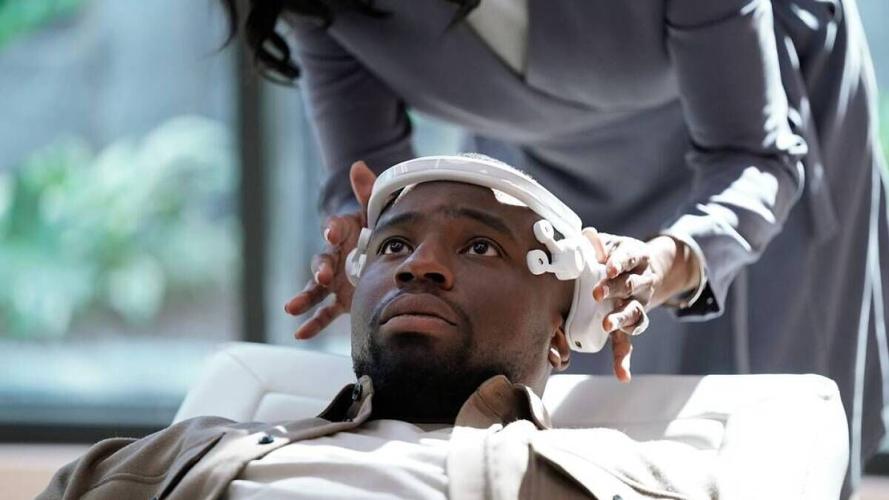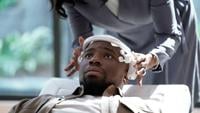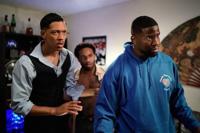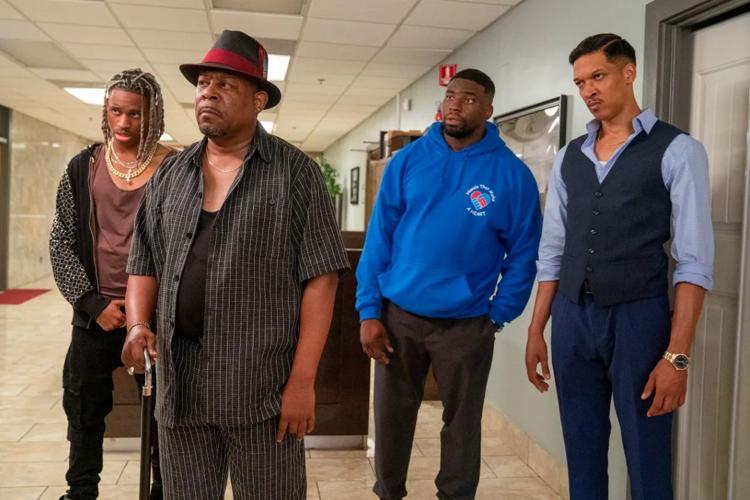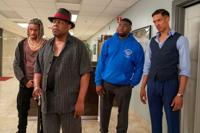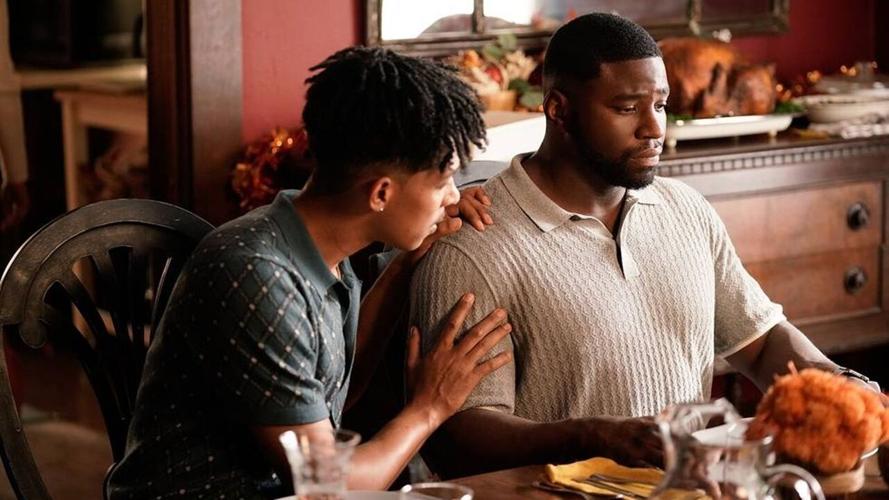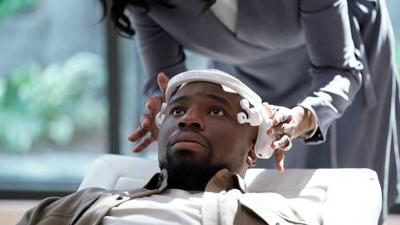This series was developed and produced for AMC Networks and the executive producer is Mark Johnson, one of the guys behind Better Call Saul (2015). Unfortunately, the network canceled the show before it was set to premiere in 2023. Tubi, the free streaming service, acquired it and is now presenting it as an original. The creator is Tearrance Arvelle Chisholm, a playwright who has worked on projects like Boomerang (2020) and Clipped (2024). The co-showrunner is Kirk A. Moore, a producer for American Crime (2015) and For Life (2020), which were two of my favorite, legal dramas of the past decade. Better Call Saul is arguably a legal drama too, but this series is very far removed from that genre. If anything, this series feels like it could be an offshoot of Black Mirror (2011), particularly its most recent, 7th season.
Okieriete Onaodowan is a Grammy-winning actor for his role in Hamilton (2015). He also had a role in the Oscar-winning American Fiction (2023) and he came off a role in the series Station 19 (2018), a spin-off of the hit drama, Grey's Anatomy (2005). Here, Onaodowan stars as Demascus Haynes, a 33-year-old graphic designer who works in Washington, DC, for the government. He's an only child whose parents are deceased. His father died when he was very young, but his mother died five years ago. He's currently in counseling. He's there ostensibly to deal with issues at work, but it's revealed that his issues really are all about the grief he's feeling about the loss of his mom.

Janet Hubert (The Fresh Prince of Bel-Air) co-stars as Dr. Bonnetville, the woman who is helping Demascus as his counselor. She recommends that he try new technology that looks like it was pulled from an episode of Black Mirror. The technology is a device that connects to a person's head and incapacitates them, while it puts their mind into a dream-state, a virtual reality. The tech is called D.I.R.T., which is an acronym for "Digital Immersive Reality Therapy." DIRT is supposed to create an alternate version of a person's life based on paths that follow either conscious or subconscious impulses.
Each episode has Demascus using DIRT and existing in a different, alternate reality. Small things about him might be different. Sometimes, big things about him might be different. It's akin to Daniel Scheinert and Daniel Kwon's Everything Everywhere All At Once (2022) and it feels as though Chisholm was inspired by that Oscar-winning film. Scheinert and Kwon who are collectively known as "The Daniels" only depict their alternate realities in glimpses. The plot of the Daniels' film is so full that we're not able to delve deep or further explore those alternate realities. Chisholm's series, though not that much different in total running time to the Daniels' film, does allow for delving deep or further exploring. At least, this show allows for more time spent in those alternate realities, but that delving or exploring isn't really there either.

Caleb Eberhardt (Rob Peace and Judas and the Black Messiah) also co-stars as Redford aka "Redd," the best friend of Demascus, or the only friend he really has in the narrative. If one is expecting Demascus to be the equivalent to Michelle Yeoh in Everything Everywhere All At Once and see Demascus transform or inhabit vastly different personas in these various realities, one will be disappointed. Demascus is virtually the same person from different reality to different reality, which is purposeful. It's almost as if it's Quantum Leap (1989), but, with the exception of the final episode, it's not meant to be a fish-out-of-water or out-of-body experience for Demascus. He's supposed to be a different person in literally every reality, but the only person who truly transforms is Redd.
Redd's personality changes the most from reality to reality. For example, the first episode titled "The Pilot" has Redd as this wealthy lawyer who is very masculine and takes his blackness to extremes at times, almost stereotypically so, exuding this tough straight guy persona. Yet, the fourth entry is literally titled "The Thanksgiving Episode," which is meta-commentary for a series that might be total meta-commentary on TV structuring, or else just lazy, and that episode has Redd's personality as that of a non-wealthy artist who is somewhat effeminate and doesn't conform to black stereotypes, mainly because in that Thanksgiving episode, Redd is gay. Eberhardt's performance is incredible in both those episodes in that he's absolutely convincing as both personas. He disappears into both roles effortlessly. He's also the scene-stealer in pretty much every other episode and he's no question the breakout star of this show.

Demascus' personality doesn't change. He's pretty much the same guy from episode to episode. Obviously, this is purposeful because the show is really trying to hammer home Demascus' grief and possible depression being pervasive throughout. However, in that fourth episode, Redd is gay, but so is Demascus and for his personality not to change at all feels odd. The fact that he would be gay at all is odd, which has all kinds of implications. There's a reality where Yeoh's character in Everything Everywhere All At Once is all of a sudden gay, but the Daniels' film can get away with it because Yeoh's character is literally a different person, literally inhabiting a different body. Here, Demascus' gay persona isn't a different or separate person. His gay persona is meant to be a path created from some impulse in his conscious or subconscious because that's how DIRT is supposed to work. This means this gay impulse was inside of him all the time. Yet, the show does nothing further with it.
One episode is titled "Anthology" and the whole series feels like an anthology where each story is different but utilizing the same actors. If that's all this was, that would be fine. However, these different realities are supposed to be extensions of Demascus' conscious and subconscious. They're all supposed to be paths that lead back to who Demascus really is. In the first episode, he says nobody knows him and Dr. Bonnetville responds that he might not know himself. This series is clearly dealing with identity. Yet, except for a few moments here and there, Dr. Bonnetville never does much analyzing of those realities or paths or parts of Demascus. We never get the true meaning behind those alternate realities.

For example, there is no follow-up to that Thanksgiving episode. The next episode simply moves on to the next alternate reality. There is no scene where Dr. Bonnetville sits down and asks Demascus why he imagined a reality where he and his best friend were in a gay relationship. There's no examination at all. There's no conversation. It's almost as if these differences, some of which fundamental, don't matter. The question then becomes if they don't matter, then why have them at all? Why have an episode of Demascus being in a same-sex relationship with Redd who is straight, if it didn't matter or it said nothing about Demascus' sexuality?
Demascus' name could be a variant of Damascus, which is the name of a Muslim city. Demascus isn't Muslim, but that name is also a variant of Damaskos, the son of Hermes, a character from Greek mythology who was the herald of the gods. Hermes could travel between worlds, which is essentially what Demascus does, using his therapist's technology. As such, simply watching Demascus travel between worlds is compelling only if the technology aspect is ignored. The framework isn't as interesting as what's in the frames. The individual stories are excellent. The overarching story is not. The series is still good for those individual stories. Martin Lawrence (Bad Boys for Life and A Thin Line Between Love and Hate) guest stars and is a scene-stealer in how funny he is. Lynn Whitfield (The Chi and A Thin Line Between Love and Hate) also guest stars and she gives an amazing, knock-out performance. I loved both Lawrence and Whitfield in their limited screen time.

Rated TV-MA-L.
Running Time: 30 mins. / 5 eps.
Available on Tubi.

